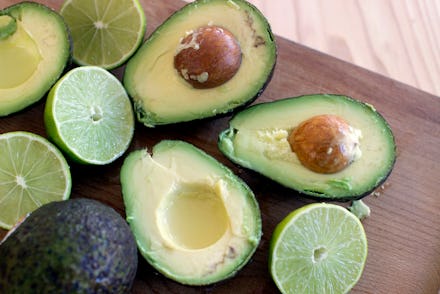Avocados and Salmon Are Not Considered "Healthy" by FDA Standards

Chocolate pudding is healthy and salmon is not.
That's what the Food and Drug Administration has told American consumers for more than 20 years, but clearly something is not right. Finally, that something is being addressed.
Kind, the company responsible for making the nutty snack bars you can find almost anywhere, has officially convinced the FDA to revaluate its definition of the word "healthy."
On Tuesday, the FDA permitted Kind to print "healthy" on its packaging, when just a year ago, it was demanding Kind peel it off. The FDA also announced it would reconsider its parameters for "healthy."
Yes, this is a considerable win for Kind, but it's also a move in the right direction for the health of the country: The saga helps highlight the antiquated nutrition standards the FDA implements, marking a huge moment for change. Clear and reputable guidelines that outline what we should be eating for our health (and to combat the obesity crisis) are precisely what Americans need to start making educated and responsible choices about their own well-being.
A look back: Under the FDA's decades-old definition, food products with the label "healthy" cannot contain more than one gram of saturated fat per serving and cannot receive more than 15% of their calorie content from saturated fat.
Those rules don't seem particularly harsh until you realize foods with proven health benefits — like avocados, salmon, eggs and nuts — don't meet the criteria. While research has found that certain saturated fats contribute to a healthy lifestyle, the FDA's 20-year-old standards for what is healthy haven't caught up.
In March 2015, the FDA wrote a warning letter to Kind about its use of the word "healthy" on the labels of four varieties of its products.
In response to the warning letter, Kind published a blog post explaining why the FDA's objection to its "healthy" label was unfounded. In April 2015, Kind wrote:
Nuts, key ingredients in many of our snacks and one of the things that make fans love our bars, contain nutritious fats that exceed the amount allowed under the FDA's standard. This is similar to other foods that do not meet the standard for use of the term healthy, but are generally considered to be good for you like avocados, salmon and eggs. Here is just some of the recent news and research on the significant nutritional benefits of nuts.
Preach.
What this means for other food companies: Once the FDA gets its act together and redefines the meaning of "healthy," many food products will have to rebrand, reconfigure their ingredients or both.
Certain food products, like freaking fat-free pudding, for goodness sake, have been able to wear the "healthy" label on their sleeves because their low-fat content met the FDA's guidelines. The fat-free trend is so very 1990, and it's time to catch up with the times.
Fat-free and low-fat versions of foods are often padded with other ingredients — like sugar, flour and sodium — in order to compensate for the lost flavor that the removed fat provided. So they may not have fat, but their "healthy" description is positively subjective.
Food marketers know their packaging makes a difference: Shoppers' buying-decisions are greatly informed by labels. A recent survey conducted by Consumer Reports found that 73 % of consumers seek out foods labeled with the word "natural," even though this word is essentially meaningless as the FDA has yet to prescribe guidelines to the terminology. It can be assumed, then, that foods labeled as "healthy," have a similar come-hither-and-buy-me affect.
What this means for you: The takeaway here is not that you should go on an all-Kind-bar diet. Instead, you should work to become more of an educated and suspicious shopper. And do note: Just because the FDA granted Kind with the right to use the word "healthy" on its products does not mean that Kind bars are objectively good for you.
Food policy expert Marion Nestle of New York University previously told the Huffington Post that snacks are often are too high in saturated fat and too low in other nutrients to earn a badge of health.
"I recognize that the FDA's rules appear absurd, but that's what the FDA has had to do to prevent makers of candy-like products for making health claims for them," Nestle told Huffington Post. "If it were up to me, the FDA would not allow health claims on any food product, except perhaps for foods that are minimally processed, but that's just me."
When it comes to packaged foods in particular, you cannot judge a snack by its wrapper. Reading deeper into ingredient lists and understanding that phrases like "healthy" and "natural" are often arbitrary is the first step to becoming a smarter eater.